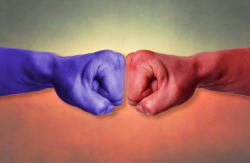
(Note: This is a talk given at an academic awards ceremony to students, parents and teachers.)
In the ‘60s during the flowering of the hippie generation, young people didn’t trust anyone over 30. We didn’t like adults, didn’t want to become one. I recall vividly vowing that I would be dead before I turned 30, and I worked hard to achieve that goal. In fact, those who know me would say I did achieve it. Well, apparently, several of you share my attitude toward becoming an adult.
I’ve been thinking a lot about adulthood this year. During my meetings with students who are struggling with their studies, I find myself talking about the difference between being an adult and being a child. “It’s time to stop behaving like a boy; you’re almost a man,” I say. “Do you want to remain a girl, or will you accept that you’re becoming a woman?” I ask. Despite my continuing belief that becoming an adult ain’t all good, it is clear to me that certain adult qualities are at least partially responsible for the success of most of the students whom we are honoring here this morning. It is these qualities that can separate a man from a boy, a woman from a girl, the honor roll from academic probation.
I’m going to tell you a couple of stories that capture the complete absence of some of these adult qualities. I hesitate to tell the first story because it is so embarrassing, but I want to illustrate my point in what I hope will be a memorable way.
I was 16 and headed off Cape Ann over the Andrews bridge. The bridge had just been built to take route 128 over the Annisquam River and into Gloucester. It’s a very high bridge, and, as my friend and I were driving over it, we got this notion that it would be cool to drop a big rock from that great height.
So we stopped and found a really nice rock. It must have weighed about 50 pounds. I carried it to the middle of the bridge and let it go. And then time seemed to slow way down—at least in my memory. When the rock was about six feet from my open hands, I saw the bow of a boat back under the bridge on a perfect line to meet the falling rock. It couldn’t have been lined up better if I had tried. My gut went all loose in terror as the rock and the boat moved toward what looked like an inevitable collision.
There were three people in the boat, one in the stern near the outboard motor. I envisioned the rock tearing a hole in the floor of the boat or smashing the skull of one of the three people. When the rock was 10 or 12 feet above the boat, it was directly over the head of the man in the stern. With every fiber of my being, I willed the boat clear of the rock’s path. The rock hit the water just a foot from the stern. It splashed unnoticed into the white turmoil just behind the engine.
I couldn’t move. Never have I felt such fear and stupidity and elation. Why hadn’t I thought to check the other side of the bridge to see if any boats were coming? Why had I even thought it was ok to drop a rock from a bridge? Why hadn’t I thought?
I was worse than an animal. I was a moron able to see only the immediate moment—rock, height, water, splash, cool. My sense of reality hadn’t extended beyond me and a one-foot cylinder of space descending 300 feet to the water’s surface—a cylinder the diameter of that rock. If I had thought about a river and boats and the harbors the river connected, if I had thought about people and falling rocks and consequences beyond splash, I never would have stopped my car.
Now, the students I see in my office about their academic troubles are not potential murderers and morons. But many share the same failure to think about the consequences of their actions. They don’t see the connection between today’s decision to blow off their homework and tomorrow’s consequences. They live within a small cylinder of reality. They see only the splash—the momentary thrill of hanging out, going to a party, playing computer games, smoking below the town fields—whatever is more cool than focusing on the big picture.
The big picture, of course, is your education, these four years of learning and how they are connected to college and to the lives you’ll live beyond college. Once you move beyond childhood’s cylinder of reality, once you look at the whole river of your life, you begin to think about the decisions you are making and to see them as a series of actions and inaction that create your future. What you do today matters. All of it has some effect on what you are able to do tomorrow.
I’ll tell you another story. When I was a senior in high school, I was all set to go to Harvard. My grades were good, and Harvard had told me I was likely to be accepted. Unfortunately, I didn’t like my school very much. During the winter I wrote a poem about the school and my antipathy toward some of the adults. One of the characters in the poem was the headmaster’s wife. My friends liked the poem—thought it was a riot. They urged me to put it in the literary magazine, another really cool idea. The problem was how to get it past the faculty advisor. Because I don’t want to give you any ideas, I won’t tell you how I solved that problem. But when the magazine was published, there was my poem.
It created quite a splash. That was probably the only issue of the magazine that was never mailed to parents and alumni. After he had finished with damage control, the headmaster summoned me to his office. At the time, he was a powerful man—a respected, long-time headmaster and head of the College Board. “Alden,” he said to me, “I have just written to Harvard the worst recommendation I have ever written about a student. You will not be attending Harvard next year.”
I left his office and applied to Tulane. I didn’t think it really mattered. I lived comfortably inside that small cylinder of reality. In fact, I didn’t discover that it did matter until my senior year in college when I was offered a job as technical director in the theatre department at Louisiana State University. Suddenly, I realized that my network of connections was all in the South, and I didn’t want to live in the South. At that moment, I understood what the Harvard network might have meant to me. At that moment, I saw the whole river of my life and knew what my poem—that moment of fun—had cost me.
Well, I think you probably get the point. Children and adults make decisions very differently. Adults think before acting; they can assess the long-range consequences of their present decisions; and they can postpone the momentary pleasure of the cool splash for the more substantial reward of meaningful future achievement. They do the work that needs to be done now.
There are a couple of other qualities that separate adults from children. I’ll tell you what has impressed me the most about many of the students with whom I discuss their academic troubles: their insight into themselves and their understanding of their problems. Time after time, they come into my office and tell me exactly what their problems are. I never learned how to write well, they say. I always make careless errors in math. I never show the steps in my logic. I don’t speak enough in class. I have a learning disability that makes it difficult for me to write the assignments down accurately. I can’t memorize. I’m overwhelmed by large projects. I think my teacher doesn’t like me. It takes intelligence to analyze a problem, to identify a cause. These students are clearly intelligent. They shouldn’t be struggling with D’s and F’s.
So why are they? What’s the difference between these students and their more successful peers? Well, it’s the difference between hiding from a problem and confronting it—the difference between taking action to solve the problem and waiting for someone else to solve it. If you have identified the problem, the next question becomes what are you going to do about it? Are you going to take responsibility for solving it? The child says no. The adult says yes.
If a woman knows that writing is a problem, she devises a plan to write her essays in segments and bring each segment to her teacher for guidance. The girl, on the other hand, continues to procrastinate until the last minute and then wastes hours of worry and anguish repeating the mistakes of the past. If a man knows his problem is recording assignments accurately when he hears them, he shows his teacher what he has written and asks for clarification. The boy ducks quickly out of class and wings it on his own later that night. If adults know they need a more structured study environment, they put themselves into a supervised study environment. Children wait for someone else to notice and put them in.
These, then, are the qualities that distinguish the adult from the child and lead to success—the ability to think before acting, the willingness to sacrifice momentary pleasure for long-term success, the capacity to confront and solve problems. All these require self-discipline and a sense of responsibility.
It sounds so obvious. Why do so many young people resist becoming adults? Sure, there’s still good reason not to trust anyone over 30. But I think the reason may be simpler. We tend to be rather lazy creatures, and facing our problems and solving them seem to require too much time and energy. The child wants to play and hang out. Well, so does the adult. The difference is that adults are willing to sacrifice some of the playtime because they have discovered that the river is a river.
This speech is part of a collection titled Dead Man Talking by Alden S. Blodget.
Like most of the pictures on ParentsAssociation.com, the picture posted with this article is courtesy of a free download from Pixabay.com.
Stupid Choices, Stupid Choices And Second Chances, Stupid Choices In Life
Adolescent Choices, Adolescent Choices And Consequences, Choices Of Adolescent, Positive Adolescent Choices Training



